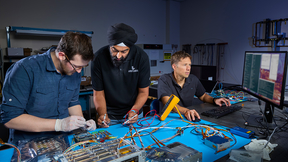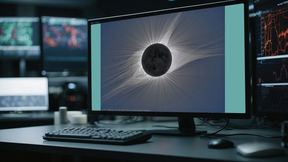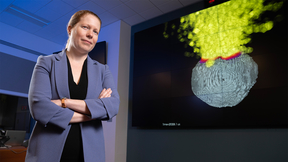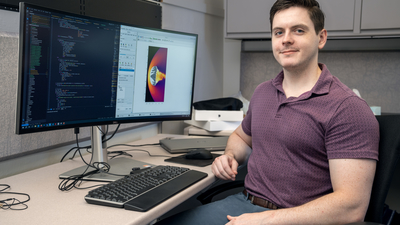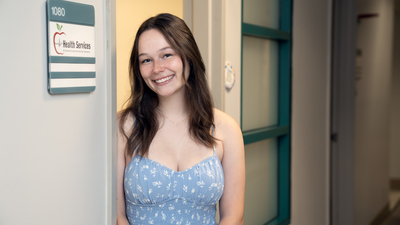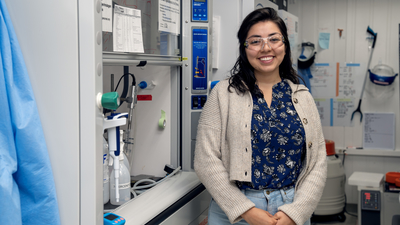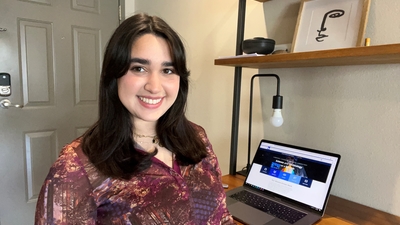Ripple effects: LLNL internships propel students forward with real-world projects
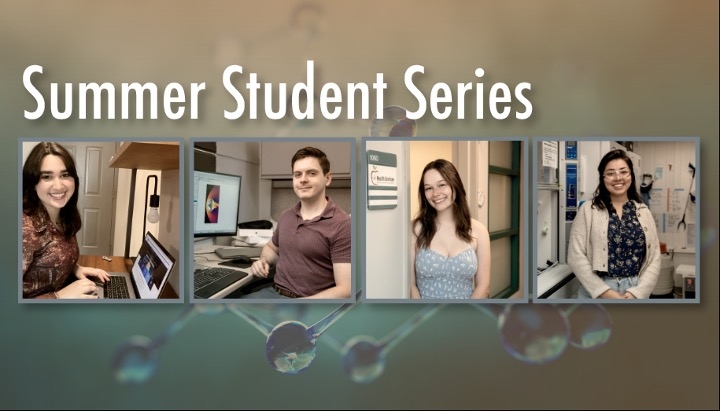 (Download Image)
(Download Image)
From left to right: Gianella Martinez-Gugliotta, Sean Stokes, Julia Bennett and Juliana Trujillo. All four interns are working at LLNL this summer and share the diverse projects they’re working on at the Lab.
Every year, Lawrence Livermore National Laboratory (LLNL) welcomes hundreds of interns for an experiential, hands-on approach to learning. Working with some of the brightest minds in their fields, LLNL’s interns have the opportunity to explore new projects, build their skills, connect with mentors and integrate into Lab culture — resulting in a meaningful experience that both supports the Lab’s missions and enriches their future careers.
In this second installment of the Lab’s Summer Student Series, meet some of the Lab’s 2023 summer interns and learn about their contributions through their projects. Each one of these students has a different background and they are passionate about their experience at LLNL. Learn about their work and how they’re helping making the impossible possible at the Lab.
Sean Stokes
State University of New York at Buffalo
Aerospace engineering
Sean Stokes studies aerospace engineering at the State University of New York at Buffalo. Stokes poses next to his work station where he is responsible for computation modeling of asteroid airbust events. Photo credit: Blaise Douros/LLNL.
Sean Stokes is interning with the Lab’s Planetary Defense team this summer. An aerospace engineering major at the State University of New York (SUNY) at Buffalo, Stokes is about to enter the third year of his Ph.D. program. At SUNY Buffalo, Stokes works at the Crashworthiness for Aerospace Structures and Hybrids (CRASH) Lab where he models hypervelocity impact physics utilizing computational methods such as smoothed particle hydrodynamics and arbitrary Lagrangian-Eulerian.
As a child, Stokes was drawn to space and dreamed of meeting an astronaut. That interest stuck with him as he grew older and guided his path through school, where he focused his studies on aerospace. After getting his bachelor’s degree in aerospace engineering at SUNY Buffalo, he realized that there was more he wanted to learn while applying for jobs and became interested in research. Enter Livermore Lab.
At the Lab, Stokes is working on computational modeling of asteroid airburst events using smoothed particle hydrodynamics. As part of his work, Stokes analyzes the influence of asteroid strength characteristics on energy deposit rate and penetration depth of spherical asteroids. In addition, he has contributed to LLNL’s Spheral software by developing the ability to model additional asteroid geometries in both 2D and 3D. Stokes explained that these additional asteroid geometries allow us to understand an asteroid’s shape and better predict threats an asteroid may possess during an airburst event.
“An airburst event is when an asteroid enters our atmosphere and is subject to drag forces from air interacting with the surface of the asteroid. As the asteroid descends it breaks up into smaller fragments that then burns up and releases energy which can be enough to flatten cities,” Stokes said.
In the future, Stokes hopes to continue pursuing his passion for aerospace and research. He credits LLNL for exposing him to different areas of space-oriented careers and is eager to continue doing research within aerospace engineering though the Lab and SUNY Buffalo’s CRASH Lab.
Julia Bennett
University of Texas at Austin
Public health and pre-medicine
Julia Bennett is a senior at the University of Texas at Austin majoring in public health and pre-medicine. At the Lab, she is part of the Health Services Department. Photo: Blaise Douros/LLNL.
Julia Bennett is spending her summer internship in the Lab’s Health Services Department (HSD). She is also a member of the Lab’s Reserve Officer Training Corps (ROTC) scholar program for the Air Force. She is completing her last year at the University of Texas at Austin majoring in public health and pre-medicine. Bennett’s internship at the Lab aligns with her passion for advocating for people through medicine and health education.
“I am currently applying to medical school and this experience has given me great insight into how the medical world works and operates on a larger scale. Every person at HSD has been extraordinarily helpful and wants me to not just succeed as an intern, but long after my time here. I never thought I would be lucky enough to be here and the wait was truly worth it.”
At the Lab, Bennett is working on a project about heat illnesses and physiological monitoring. She is also exploring possible recommendations for local, state and federal government regulations for preventing heat illness. What she finds most interesting about this project is that it dives into several topics such as health policy, biological monitoring and ethical concerns.
There is currently no U.S. federal heat standard, and it is up to states to regulate how long workers can be outside in extreme heat. California is one of three states with a permanent heat standard established statewide. Bennett and her team in HSD have focused much of their efforts on a proposal for a U.S. federal heat standard that would benefit workers across the country.
“The industrial hygienists and supervisors at LLNL go the extra mile by implementing work rest cycles and additional regulations. LLNL serves as a great example of a responsible employer that goes above and beyond by using temperature monitoring and resources such as LLNL's heat wave website.”
What inspired Bennett to apply for an internship at LLNL is her passion for advocacy and her dream of becoming a physician. “This was kind of the perfect place to come intern at. I get to work underneath the occupational health physicians, and I'm super passionate about advocacy, especially for vulnerable groups. When I was researching all these regulations and laws, I saw an opportunity to fill a gap that would help a lot of people”.
Bennett hopes to continue devoting her career to helping others in any way that she can. The Lab’s ROTC scholar program has connected her to medicine and health experts that have mentored her towards her career aspirations. For Bennett, the work has just begun, and she’s excited for what’s ahead.
Juliana Trujillo
University of Virginia
Biomedical engineering
Juliana Trujillo is a graduate research assistant at the University of Virginia majoring in biomedical engineering. Trujillo poses next to her work environment at the Lab. Photo: Blaise Douros/LLNL.
Juliana Trujillo is interning this summer in the Materials Engineering Directorate at the Lab. She first heard about LLNL through her mentor that she met at the Society of Hispanic Professional Engineers National Convention in 2022 and was inspired when she heard her mentor, Elisa Wasson, Ph.D., talk about her work and experiences at LLNL.
Trujillo is currently working as a graduate research assistant at the University of Virginia. She is part of the university’s Griffin Lab, which develops tissue engineering strategies using novel particle-based, instructive biomaterials for accelerated and improved recovery in healing.
At LLNL, she is part of a proof-of-concept cartilage regeneration project using biomaterials. Trujillo explained cartilage does not naturally regrow and the current treatment methods that are available are invasive or provide little relief for patients. Her team is working with a new method of biomaterial generation that encapsulates cells in air into microspheres, which can then be stacked to provide better support for the cells by mimicking the natural, layered environment of cartilage.
“I love that I can use my previous experiences at the University of Virginia for this project. I am already learning skills and knowledge that I can take back with me,” said Trujillo.
What led Trujillo to working on this project is her passion for science that directly helps people. She wants to use engineering to help patients with diseases that are currently difficult to treat.
“Being able to work on something that may ultimately help many people really inspires me. Finding solutions for these types of problems feels like working on a puzzle because all the solutions can come together to solve an overarching problem.”
The goal of the biomaterial project is to successfully conceive different layers of material and test them with cells as a proof-of-concept that the new method is useful. Trujillo is excited for where the world of biomedical engineering will take her next and credits the Lab for solidifying her passion in a career that blends medicine and science.
Gianella Martinez-Gugliotta
Loyola Marymount University
Communication and media studies
Gianella Martinez-Gugliotta is a senior at Loyola Marymount University majoring in communication and media studies. Martinez-Gugliotta is a remote intern working on digital communications for the Lab. Photo: Gianella Martinez-Gugliotta.
Meet the author of the summer student series: intern Gianella Martinez-Gugliotta. Martinez-Gugliotta never imagined the Lab would have careers for non-STEM professionals, and she was pleasantly surprised to learn the Lab offers many roles that help keep it running. From administrators to creatives to skilled tradespeople, she quickly noticed that all employees work as a team to contribute to the Lab’s mission, and her office’s job is to tell their stories.
Martinez-Gugliotta is a remote digital communications intern for the Lab’s Office of Strategic Communications (OSC). “I am currently the writer for the summer student series. My goal is to highlight different interns and their journeys to the Lab, share their cultural experiences and highlight the projects they’re working on. Through these stories, I want to tell prospective interns considering an internship at LLNL that they, too, can be here and should apply.”
Martinez-Gugliotta is entering her last year at Loyola Marymount University majoring in communication and media studies. Her decision to intern at LLNL came after participating in the independent undergraduate research program and presenting at the Fifteenth Annual Symposium at her university. After completing her program, she realized she enjoyed conducting research and was curious to see if scientific organizations had a spot for her where she could improve her communications and writing skills. She then looked at U.S. Department of Energy national laboratories to get exposed to science communication roles. LLNL was happy to answer her call, but it wasn’t what she expected.
“I’ve always really been drawn towards writing and considered it a great form of expression. When applying for this internship, I did not expect that a significant part of my role would be various forms of writing, but I’m glad that it ended up this way,” she shared. “This is my first time coordinating, interviewing and writing articles. I've learned a lot through the process.”
Highlights from Martinez-Gugliotta’s internship include writing articles, digital communications research and analysis, and supporting the Lab’s diversity, equity and inclusion goals. She said she is determined to continue a career in communications and writing.
“Prior to this internship, I did not fully understand how much time and effort goes into writing an article. This internship showed me just how much goes into creating content and telling people’s stories. I learned that when people work together, they can make something happen even if it seems impossible to manage. This has made my last year of college a lot less nerve-wracking because I now have more knowledge and real-world experience than I did before.”
– Gianella Martinez-Gugliotta and Abel Morelos
---
At Lawrence Livermore National Laboratory, our employees are our greatest asset. LLNL continues to act on its commitment to foster strong values and a culture that embraces inclusion, diversity, equity and accountability (IDEA). Our Laboratory culture aims to allow everyone to feel like they belong and that their thoughts and ideas are valuable contributions to LLNL’s mission. IDEA at LLNL has proven to be vital in supporting the Laboratory's mission, driving innovation, groundbreaking research and discovery. We encourage students to explore our available student programs and apply.
Contact
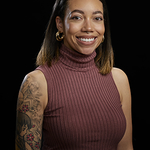 Lauren Casonhua
Lauren Casonhua
[email protected]
(925) 423-3141
Related Links
See Part 1: Summer interns persevere to arrive at LLNLTags
Space Science InstituteFeatured Articles
